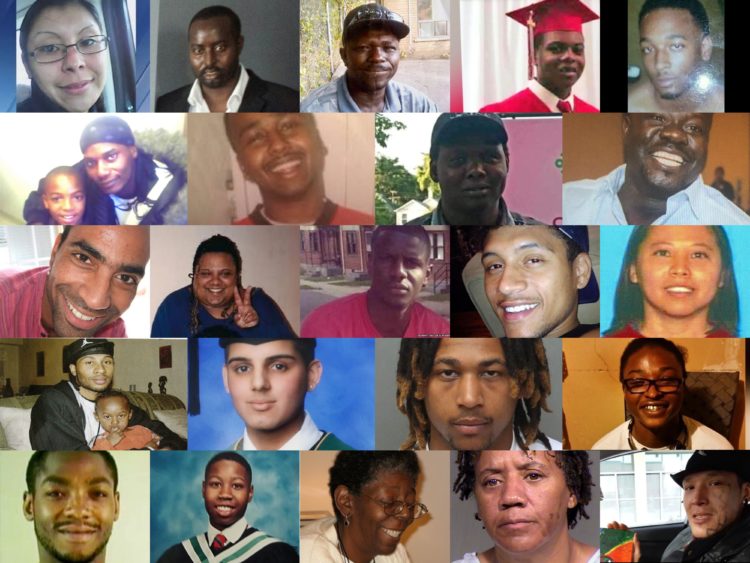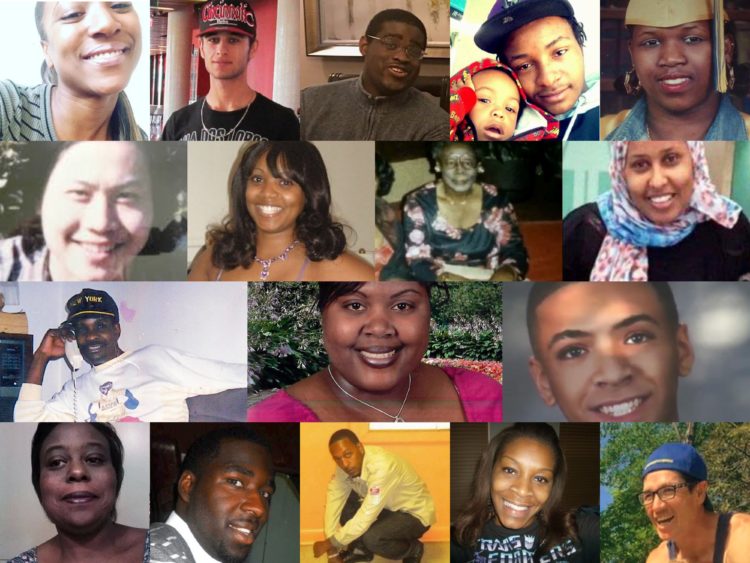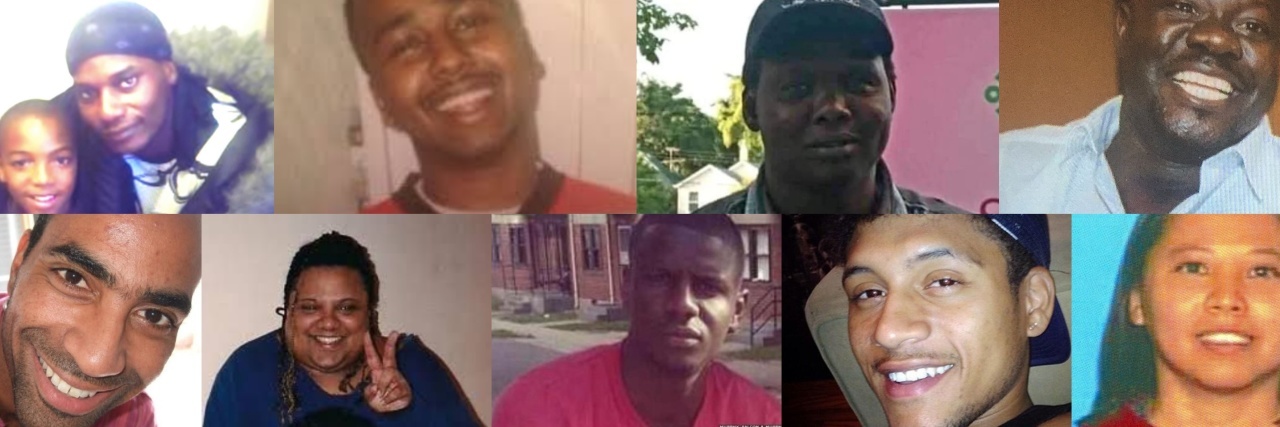There’s a line in Donna-Michelle St. Bernard’s “Sound of the Beast” that I think about all the time: “I’m with them, whoever they are.”
I’m with the old man yelling at the air in the waiting room of my psychiatrist’s office. I’m with the manic mother facing a judge to challenge her court-ordered hospital stay. I’m with every patient who has been punished for a behavior caused by the very illness they are receiving treatment for. I’m with my fellow mentally ill people of color who face racism daily, as if living with a mental illness isn’t already hard enough. I’m with every Black person killed by a police officer, I’m with the ones who had mental illnesses, the ones who were killed while experiencing a mental health crisis, by the very people who were sent to help them. I’m with them.
Rodney Levi and Regis Korchinski-Paquet are the latest of a long list of BIPOC mentally ill victims of police violence in Canada, where I live. Or at least the latest to make the news. Rodney Levi was a 48-year-old man of the Metepenagiag Mi’kmaq Nation. He was shot and killed by the RCMP while attending a dinner at the home of his church minister, from whom he sought guidance as he was experiencing mental health problems. Regis Korchinski-Paquet was a 29-year-old Indigenous-Black woman living in Toronto. She died by reportedly falling from a 24th floor apartment balcony during a police intervention, after her mother had called the police expecting them to take her to the local CAMH (Centre for Mental Health and Addiction).
Rodney Levi was described as “non-violent.” Many police victims are. But the overwhelming statistics and the never-ending news cycle on police brutality and police-caused deaths against Black people especially — some of them children, some of them killed in their own homes where they were literally asleep only moments before — show us that even a non-violent, unarmed and compliant individual is not safe from the white-supremacist oppressive institution that is the police.
There is much discussion of replacing police with mental health professionals to respond to calls regarding an individual in distress. Many people have pointed out that a lot of mental health professionals, and the mental healthcare system itself, are just as racist and harmful as the police. I’m sure every BIPOC service user (so this doesn’t even include those who are denied services or don’t have access to them), myself included, has a story of being mistreated and discriminated against by a psychiatrist, psychologist, social worker or mental health nurse. But at least they don’t carry guns, right? Regis Korchinski-Paquet wasn’t shot though, so who’s to tell if the outcome would have been any different had someone other than the police intervened. I don’t know what the solution is. I don’t know if one exists right now, and I don’t know how to make one.
So many mentally ill people have been killed by police officers. An unquestionable majority of them are Black. Most of the remaining numbers are accounted for by Indigenous people and non-Black people of color. A number of them were non-violent, unarmed and compliant in the police interaction during which they died, and a number of them were not. I don’t know how much I expect non-mentally ill people to understand, I don’t know how to accurately explain psychosis or mania to someone who has never experienced anything like it, and so it don’t know if it’s possible to actually get this across: mentally ill people can’t always be calm and rational. They have an illness that impacts their moods, thoughts and behaviors… that’s kind of the point. They can be erratic, unreasonable or violent, they may not understand orders or choose to disregard them. And while some of these things may justify some amount of force and/or restraint, none of them warrant death. None.
I’m heartbroken and furious: I wish there weren’t so many names. I wish there were so few I didn’t have to accept my inability to say them all. I wish there were so few I could remember each one. I wish there were literally zero.
So I’m with them. All of them. Those who resisted arrest or otherwise didn’t comply with orders. Those who had committed a crime. Those who were having a single bad day after years of stability, and those for whom one bad day was just more of the same. Those who went to treatment and took their meds religiously, and those who didn’t — no matter how much anyone tries to spin it so that their mental health crises seem like their own fault. Those who couldn’t access a diagnosis or mental healthcare in the first place. And those who didn’t make headlines and whose names I cannot learn. When I say the names I do know, I mean those other names too. I’m with them, whoever they are.


Rodney Levi, 48 – 2020
Regis Korchinski-Paquet, 29 – 2020
Steven Taylor, 33 – 2020
D’Andre Campbell, 26 – 2020
Greg Ritchie, 30 – 2019
Andre Gladen Sr., 36 – 2019
Pamela Turner, 44 – 2019
Osaze Osagie, 29 – 2019
Machuar Madut, 43 – 2019
Miles Hall, 23 – 2019
Shukri Ali Said, 36 -2018
Saheed Vassell, 34 – 2018
Jaskamal Singh Lail, 25 – 2018
Nicholas Gibbs, 23 – 2018
Pierre Coriolan, 58 – 2017
Abdirahman Abdi, 37 – 2016
Deborah Danner, 66 – 2016
Alfred Olango, 38 – 2016
Loreal Tsingine, 27 – 2016
Kwasi Skene-Peters, 21 – 2015
Andrew Loku, 45 – 2015
Abdurahman Ibrahim Hassan, 39 – 2015
Sandra Bland, 28 – 2015
Freddie Gray, 25 – 2015
Anthony Hill, 26 – 2015
Pearlie Golden, 93 – 2014
Jermaine Carby, 33 – 2014
Phuong Na ‘Tony’ Du, 51 – 2014
Alain Magloire, 41 – 2014
Tanisha Anderson, 37 – 2014
Ezell Ford, 25 – 2014
Laquan McDonald, 17 – 2014
Michelle Cusseaux, 50 – 2014
Kayla Moore, 41 – 2013
Ian Pryce, 30 – 2013
Sammy Yatim, 18 – 2013
Miriam Carey, 34 – 2013
Shereese Francis, 30 – 2012
Michael Eligon, 29 – 2012
Jazmyne Ha Eng, 40 – 2012
(This non-exhaustive list includes Black people, Indigenous people and non-Black people of color who were killed by police or died while in police custody in recent years, who had mental health problems — formally diagnosed with a mental illness or not. It’s focused mainly on Canada since I live there, as well as the United States.)
Photos submitted by contributor

